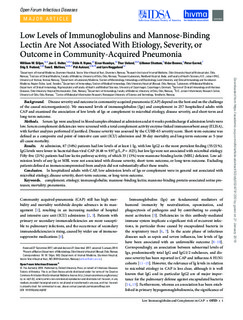| dc.contributor.author | Siljan, William Ward | |
| dc.contributor.author | Holter, Jan Cato | |
| dc.contributor.author | Nymo, Ståle Haugset | |
| dc.contributor.author | Husebye, Einar | |
| dc.contributor.author | Ueland, Thor | |
| dc.contributor.author | Skattum, Lillemor | |
| dc.contributor.author | Bosnes, Vidar | |
| dc.contributor.author | Garred, Peter | |
| dc.contributor.author | Frøland, Stig Sophus | |
| dc.contributor.author | Mollnes, Tom Eirik | |
| dc.contributor.author | Aukrust, Pål | |
| dc.contributor.author | Heggelund, Lars | |
| dc.date.accessioned | 2019-03-01T06:46:58Z | |
| dc.date.available | 2019-03-01T06:46:58Z | |
| dc.date.created | 2018-06-19T15:16:19Z | |
| dc.date.issued | 2018 | |
| dc.identifier.citation | Open Forum Infectious Diseases. 2018, 5 (2), . | nb_NO |
| dc.identifier.issn | 2328-8957 | |
| dc.identifier.uri | http://hdl.handle.net/11250/2588146 | |
| dc.description.abstract | Background
Disease severity and outcome in community-acquired pneumonia (CAP) depend on the host and on the challenge of the causal microorganism(s). We measured levels of immunoglobulins (Igs) and complement in 257 hospitalized adults with CAP and examined the association of low levels of Igs or complement to microbial etiology, disease severity, and short-term and long-term outcome.
Methods
Serum Igs were analyzed in blood samples obtained at admission and at 6 weeks postdischarge if admission levels were low. Serum complement deficiencies were screened with a total complement activity enzyme-linked immunosorbent assay (ELISA), with further analyzes performed if justified. Disease severity was assessed by the CURB-65 severity score. Short-term outcome was defined as a composite end point of intensive care unit (ICU) admission and 30-day mortality, and long-term outcome as 5-year all-cause mortality.
Results
At admission, 87 (34%) patients had low levels of at least 1 Ig, with low IgG2 as the most prevalent finding (55/21%). IgG levels were lower in bacterial than viral CAP (8.48 vs 9.97 g/L, P = .023), but low Igs were not associated with microbial etiology. Fifty-five (21%) patients had low lectin pathway activity, of which 33 (13%) were mannose-binding lectin (MBL) deficient. Low admission levels of any Ig or MBL were not associated with disease severity, short-term outcome, or long-term outcome. Excluding patients defined as immunocompromised from analysis did not substantially affect these results.
Conclusion
In hospitalized adults with CAP, low admission levels of Igs or complement were in general not associated with microbial etiology, disease severity, short-term outcome, or long-term outcome. | nb_NO |
| dc.language.iso | eng | nb_NO |
| dc.publisher | Oxford University Press | nb_NO |
| dc.rights | Attribution-NonCommercial-NoDerivatives 4.0 Internasjonal | * |
| dc.rights.uri | http://creativecommons.org/licenses/by-nc-nd/4.0/deed.no | * |
| dc.title | Low levels of immunoglobulins and mannose-binding lectin are not associated with etiology, severity, or outcome in community-acquired pneumonia | nb_NO |
| dc.type | Journal article | nb_NO |
| dc.type | Peer reviewed | nb_NO |
| dc.description.version | publishedVersion | nb_NO |
| dc.source.pagenumber | 7 | nb_NO |
| dc.source.volume | 5 | nb_NO |
| dc.source.journal | Open Forum Infectious Diseases | nb_NO |
| dc.source.issue | 2 | nb_NO |
| dc.identifier.doi | 10.1093/ofid/ofy002 | |
| dc.identifier.cristin | 1592386 | |
| dc.description.localcode | © The Author(s) 2018. Published by Oxford University Press on behalf of Infectious Diseases Society of America. This is an Open Access article distributed under the terms of the Creative Commons Attribution-NonCommercial-NoDerivs licence (http://creativecommons.org/licenses/ by-nc-nd/4.0/) | nb_NO |
| cristin.unitcode | 194,65,0,0 | |
| cristin.unitname | Fakultet for medisin og helsevitenskap | |
| cristin.ispublished | true | |
| cristin.fulltext | original | |
| cristin.qualitycode | 1 | |

